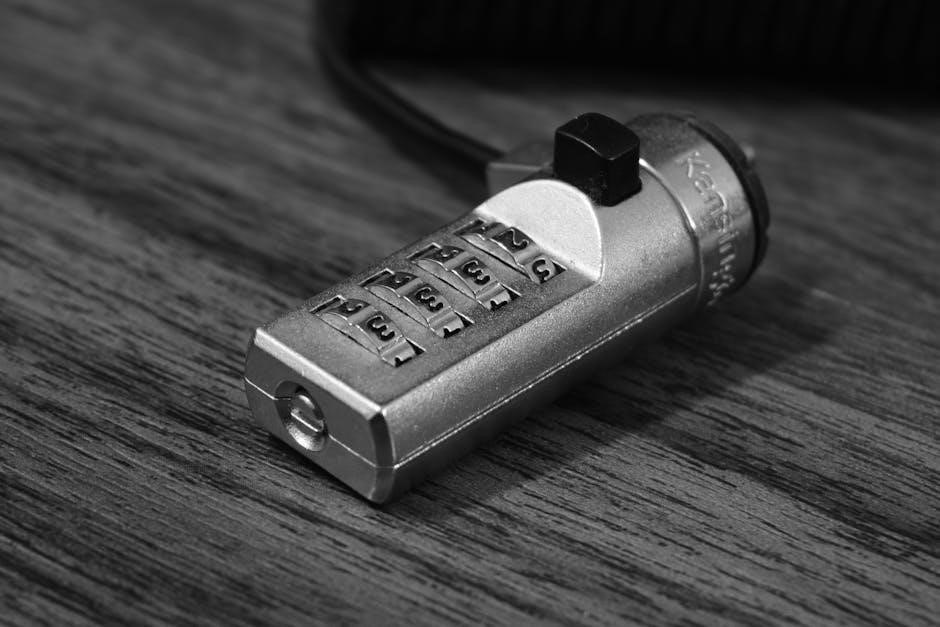The CompTIA Security SY0-701 exam is the latest iteration of the renowned certification, offering a comprehensive assessment of foundational cybersecurity skills and knowledge.
1.1 Overview of the Exam and Its Importance
The CompTIA Security SY0-701 exam is the latest version of the certification, updated in November 2023 to align with current cybersecurity trends. It evaluates essential skills for securing enterprise environments, including risk assessment, threat mitigation, and security solution implementation. This exam is critical for entry-level IT professionals seeking to validate their foundational cybersecurity knowledge and skills, making it a cornerstone for career advancement in the field.
1.2 Target Audience and Career Opportunities
The CompTIA Security SY0-701 exam is ideal for entry-level IT professionals, network administrators, and security specialists seeking to validate their foundational cybersecurity skills. It opens doors to roles like security analyst, incident responder, and IT auditor, providing a strong foundation for career advancement in the cybersecurity field. This certification is highly regarded by employers worldwide.

Exam Objectives and Domains
The CompTIA Security SY0-701 exam evaluates skills in assessing enterprise security postures, mitigating risks, and implementing solutions. It covers domains like network security, vulnerabilities, and data protection, aligning with current cybersecurity trends.
2.1 Breakdown of Exam Domains and Weightage
The CompTIA Security SY0-701 exam consists of multiple domains, each carrying specific weightage. Key domains include Network Security (21%), Risk Management (15%), Vulnerabilities (19%), Data Protection (16%), and Security Practices (14%). These domains are designed to assess a candidate’s ability to implement secure solutions and manage enterprise security effectively.
2.2 Key Skills Assessed in the Exam
The CompTIA Security SY0-701 exam evaluates critical skills such as assessing enterprise security posture, identifying threats, and implementing solutions. It also tests the ability to manage risks, conduct vulnerability assessments, and protect data. Candidates are expected to demonstrate knowledge of security practices, incident response, and compliance. Practical application of these skills ensures readiness for real-world cybersecurity challenges.
Core Security Concepts
CompTIA Security SY0-701 covers foundational cybersecurity principles, including threat identification and risk mitigation. It emphasizes understanding vulnerabilities and implementing secure practices to protect digital environments effectively.
3.1 Foundational Principles of Cybersecurity
The CompTIA Security SY0-701 exam emphasizes core cybersecurity principles, including the CIA triad (Confidentiality, Integrity, and Availability), secure communication protocols, and access control mechanisms. Understanding these fundamentals is essential for protecting digital assets and ensuring data security. The exam also covers essential concepts like authentication, encryption, and risk management, forming the basis for advanced security practices and strategies.
3.2 Understanding Threats, Vulnerabilities, and Risks
The exam evaluates the ability to identify and mitigate threats, vulnerabilities, and risks. Threats are potential attacks, while vulnerabilities are weaknesses exploited by threats. Risks are the likelihood and impact of these occurrences. Understanding these concepts is critical for securing systems and data, aligning with the exam’s focus on real-world cybersecurity challenges and mitigation strategies.

Security Architecture and Design
Security architecture ensures systems are designed to withstand threats by aligning with business goals, incorporating security controls, and ensuring scalability and compliance with industry standards.
4.1 Designing Secure Networks and Systems
Designing secure networks and systems involves implementing security frameworks, network segmentation, and encryption to protect data. It requires a thorough understanding of security frameworks and the ability to deploy monitoring tools like intrusion detection systems. Key strategies include securing communication protocols, configuring firewalls, and enforcing access controls to ensure confidentiality, integrity, and availability. Redundancy and fail-safe mechanisms are also critical to maintain system uptime and prevent single points of failure.
4.2 Importance of Resilience and Recovery Planning
Resilience and recovery planning are critical for ensuring business continuity and minimizing downtime during security incidents. These strategies involve creating robust backup systems, disaster recovery plans, and incident response protocols to quickly restore operations. Regular testing of recovery procedures ensures preparedness and helps protect sensitive data and infrastructure from prolonged disruptions, maintaining organizational stability and customer trust.
Risk Management and Vulnerability Assessment
Risk management and vulnerability assessment are essential for identifying and mitigating threats. This process ensures alignment with compliance standards and enhances overall security posture and resilience.
5.1 Processes for Third-Party Risk Assessment
Evaluating third-party risks involves assessing vendor security controls, reviewing contractual agreements, and ensuring compliance with organizational standards. Continuous monitoring and due diligence are critical to mitigate potential threats from external partners, ensuring alignment with the organization’s risk tolerance and safeguarding sensitive data.
5.2 Conducting Audits and Security Assessments
Audits and security assessments are crucial for identifying vulnerabilities and ensuring compliance. They involve evaluating systems, policies, and processes to detect gaps and enforce standards. Regular audits help maintain organizational security by verifying controls and addressing risks proactively, ensuring alignment with industry benchmarks and enhancing overall cybersecurity posture.

Data Protection and Privacy
Data protection and privacy are critical in safeguarding sensitive information. The exam emphasizes strategies like encryption, access control, and compliance with regulations to ensure data integrity and confidentiality.
6.1 Strategies for Data Protection
Strategies for data protection include encryption, regular backups, and data loss prevention (DLP) tools. Encryption ensures confidentiality, while backups enable recovery. Access control and data masking further safeguard sensitive information, aligning with regulatory compliance and organizational security policies to minimize risks and ensure data integrity.
6.2 Ensuring Compliance with Security Policies
Ensuring compliance with security policies involves aligning practices with industry standards and regulations. Regular audits, employee training, and access controls help maintain adherence. Documentation and incident response plans are critical for accountability. Compliance ensures data integrity, reduces legal risks, and builds trust in organizational security practices, addressing both regulatory requirements and internal protocols effectively.
Preparation Resources and Study Materials
7.1 Official Study Guides and Course Objectives
Official study guides and course materials are designed to align with the SY0-701 exam objectives, providing comprehensive coverage of key concepts and skills required for certification.
Official study guides and course materials are meticulously aligned with the SY0-701 exam objectives, ensuring comprehensive coverage of key concepts, from foundational principles to advanced threat mitigation. These resources include detailed explanations, practical examples, and interactive tools, such as flashcards and practice questions, to help candidates master the skills required for certification. They are regularly updated to reflect the latest cybersecurity trends and exam focus areas.
7.2 Recommended Study Strategies and Practice Exams
Effective preparation for the CompTIA Security SY0-701 exam involves creating a structured study plan, focusing on hands-on practice, and utilizing official resources. Candidates should engage in regular practice exams to assess their readiness and identify knowledge gaps. Simulated lab environments and real-world scenario-based exercises are also recommended to reinforce practical skills and ensure comprehensive understanding of exam objectives.
Exam Format and Requirements
The CompTIA Security SY0-701 exam consists of up to 90 multiple-choice and performance-based questions, lasting 90 minutes. A minimum of 2 years of IT experience is recommended.
8.1 Details on Exam Structure and Duration
The CompTIA Security SY0-701 exam features a mix of multiple-choice and performance-based questions, with a maximum of 90 questions. Candidates have 90 minutes to complete the exam. This format assesses both theoretical knowledge and practical skills, ensuring a comprehensive evaluation of cybersecurity competencies. The time limit is designed to simulate real-world scenarios, testing candidates’ ability to think critically under pressure.
8.2 Prerequisites and Recommended Experience
While there are no mandatory prerequisites, CompTIA recommends at least 2 years of hands-on IT experience with a focus on security. Candidates should have a solid understanding of networking, hardware, and security concepts. Prior certifications like CompTIA A+ or Network+ are beneficial but not required for attempting the SY0-701 exam.
Industry Relevance and Certification Benefits
The CompTIA Security SY0-701 certification is globally recognized, validating essential cybersecurity skills and enhancing career prospects in roles like network security and risk management.
9.1 Advancements in Cybersecurity Skills
The CompTIA Security SY0-701 certification enhances skills in assessing and mitigating threats, securing enterprise environments, and aligning with current trends. It equips professionals with up-to-date knowledge to address evolving cybersecurity challenges, ensuring they can implement effective security solutions and protect digital assets against modern threats.
9.2 Global Recognition and Career Advancement
The CompTIA Security SY0-701 certification is globally recognized, enhancing career prospects in cybersecurity. It validates skills, making professionals competitive for roles like network security, risk management, and IT administration. This certification opens doors to advanced positions and industries worldwide, demonstrating expertise in securing digital environments and addressing modern threats effectively.

Updated Features of SY0-701 Exam
The SY0-701 exam has been updated to align with current cybersecurity trends, focusing on entry-level skills and enhanced content to address modern security challenges effectively.
10.1 Alignment with Current Cybersecurity Trends
The SY0-701 exam has been updated to reflect the latest cybersecurity trends, including advanced threat management, vulnerability assessment, and emerging technologies like zero-trust architecture and cloud security.
10.2 Enhancements in Exam Content and Focus Areas
The SY0-701 exam features enhanced focus on emerging technologies and real-world security challenges. It includes expanded coverage of zero-trust architecture, cloud security, and advanced threat detection. These updates ensure candidates are well-prepared to address modern cybersecurity demands, aligning with industry trends and providing a robust foundation for career advancement in IT security roles.
Mastering the CompTIA Security SY0-701 objectives ensures a strong foundation in cybersecurity. Stay dedicated, utilize study resources, and practice consistently to achieve success and boost your career confidence.
11.1 Summarizing Key Exam Objectives
The CompTIA Security SY0-701 exam focuses on foundational cybersecurity skills, including assessing security posture, implementing solutions, and managing risks. It covers domains like network security, vulnerabilities, and data protection, ensuring candidates understand core concepts and practical applications to secure digital environments effectively.
11.2 Encouragement and Motivation for Candidates
Pursuing the CompTIA Security SY0-701 certification is a significant step in advancing your cybersecurity career. Stay committed, as dedication and consistent study lead to success. This globally recognized credential validates your skills, opening doors to exciting opportunities. Embrace the challenge, remain focused, and believe in your ability to achieve this milestone in your professional journey.




Leave a Reply
You must be logged in to post a comment.